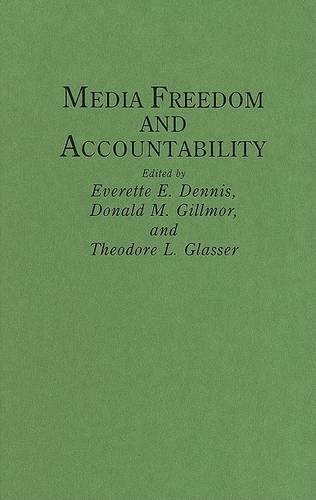
Media Freedom and Accountability
(Hardback)
Publishing Details
Media Freedom and Accountability
By (Author) Everette E. Dennis
Edited by Donald M. Gillmor
Edited by Theodore L. Glasser
Bloomsbury Publishing PLC
Praeger Publishers Inc
20th November 1989
United States
Classifications
Professional and Scholarly
Non Fiction
302.2340973
Physical Properties
Hardback
220
Width 156mm, Height 235mm
454g
Description
How, when, and to what extent should people be able to talk back to the media; what works, what doesn't, what's possible This volume, sponsored by the Gannett Center for Media Studies at Columbia University and the Silha Center for the Study of Media Ethics and Law at the University of Minnesota, examines these and other issues. With a deep concern for freedom from censorship and a strong awareness of our constitutional franchise of freedom of expression, the editors and contributors seek to define meaningful forums where citizens can air their views about media to a large enough audience to make a significant impact. The strong sense of urgency in forming these investigations results from the recognition of mass media's central and powerful role in both public and consumer life; the ability of mass media to help or harm is indisputable. The recognition of media impact by editors, broadcasting groups, corporate owners, and researchers in diverse fields, has made the public's view of the press a highly visible item on the public agenda. In spite of this, discussions of media accountability have remained conceptually muddled and formal means for public feedback have been few and feeble. The editors of Media Freedom and Accountability present and assess several forms of media accountability that function effectively within free speech parameters. They include the marketplace model, the self-regulatory model, the voluntary model, the fiduciary model, and the litigation model. Discussions of these models include evaluations of letters-to-the-editor columns, radio talk shows, ethical codes, ombudsmen, press councils, citizens groups such as Accuracy in Media, the FCC and FTC, and the court system of redress. Lewis Lapham, editor of Harper's; Alfred Balk, former editor of the Columbia Journalism Review and now with World Press Review; and Kenneth Morgan of the British Press Council, among other contributors, offer thoughtful and informative essays that approach the subject from various pragmatic and philosophical stances. Media Freedom and Accountability is made-to-order for courses in mass media, for all media practitioners, and for all those concerned with the scope of media in the United States and with methods of public response.
Reviews
. . . Dennis, Gillmor, and Glasser deserve commendation for effectively presenting the historical evolution and practical problems associated with different means to ensure media accountability. Readers will find the contributors' specific arguments and positions challenging and instructive. . . .-Journal of Broadcasting and Electronic Media
." . . Dennis, Gillmor, and Glasser deserve commendation for effectively presenting the historical evolution and practical problems associated with different means to ensure media accountability. Readers will find the contributors' specific arguments and positions challenging and instructive. . . ."-Journal of Broadcasting and Electronic Media
Author Bio
EVERETTE E. DENNIS is Executive Director of the Gannett Center for Media Studies at Columbia University and Editor-in-Chief of the Gannett Center Journal. He is author or editor of more than a dozen books including The Cost of Libel, Reshaping the Media, Understanding Mass Communication, and the First Amendment. He has also written more than 80 articles in professional journals, law reviews, and industry publications and is frequently quoted in the popular media about communication issues. DONALD M. GILLMOR is Professor of Journalism and Mass Communication and Director, Silha Center for the Study of Media Ethics and Law at the University of Minnesota, Minneapolis. He wrote or edited Free Press and Trial, Mass Communication Law, Enduring Issues in Mass Communication and Justice Hugo Black and the First Amendment. Gillmor has also written numerous book chapters and articles published in Journalism Quarterly, Journal of Media Law and Practice, Media Information Australia, Current History, and law reviews. THEODORE L. GLASSER is on the faculty of the Institute for Communication Research at Stanford University and Associate Director of the Silha Center for the Study of Media Ethics and Law at the University of Minnesota. His articles have appeared in a variety of academic and professional publications, including Journalism Quarterly, Journal of Broadcasting & Electronic Media, Journal of Communication, Critical Studies in Mass Communication, Communications and the Law, Policy Sciences, Nieman Reports, and The Quill.
